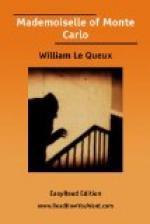Its occupier was a worthy, and somewhat wizened, widow named Mason, who was supposed to be the relict of an army surgeon who had been killed at the Battle of the Marne. She was about sixty, and suffered badly from asthma. Her house was too large for one maid, a stout, matronly person called Emily, hence the place was not kept as clean as it ought to have been, and the cuisine left much to be desired.
Still, it appeared to be a safe harbour of refuge for certain strange persons who came there, men who looked more or less decent members of society, but whose talk and whose slang was certainly that of crooks. That house in the back street of old-world Kensington, a place built before Victoria ascended the throne, was undoubtedly on a par with the flat of the Reveccas in Genoa, and the thieves’ sanctuary in the shadow of the cathedral at Malines.
Adversity brings with it queer company, and Hugh had found himself among a mixed society of men who had been gentlemen and had taken up the criminal life as an up-to-date profession. They all spoke of The Sparrow with awe; and they all wondered what his next great coup would be.
Hugh became more than ever satisfied that Il Passero was one of the greatest and most astute criminals who have graced the annals of our time.
Everyone sang his praise. The queer visitors who lodged there for a day, a couple of days, or more; the guests who came suddenly, and who disappeared just as quickly, were one and all loud in their admiration of Il Passero, though Hugh could discover nobody who had actually seen the arch-thief in the flesh.
On the Tuesday night Hugh had had a frugal and badly-cooked meal with three mysterious men who had arrived as Mrs. Mason’s guests during the day. After supper the widow rose and left the room, whereupon the trio, all well-dressed men-about-town, began to chatter openly about a little “deal” in diamonds in which they had been interested. The “deal” in question had been reported in the newspapers on the previous morning, namely, how a Dutch diamond dealer’s office in Hatton Garden had been broken into, the safe cut open by the most scientific means, and a very valuable parcel of stones extracted.
“Harry Austen has gone down to Surrey to stay with Molly.”
“Molly? Why, I thought she was in Paris!”
“She was—but she went to America for a trip and she finds it more pleasant to live down in Surrey just now,” replied the other with a grin. “She has Charlie’s girl living with her.”
“H’m!” grunted the third man. “Not quite the sort of companion Charlie might choose for his daughter—eh?”
Hugh took but little notice of the conversation. It was drawing near the time when he would go forth to meet Dorise at their trysting place. In anxiety he went into the adjoining room, and there smoked alone until just past eleven o’clock, when he put on his hat and went forth into the dark, deserted street.




